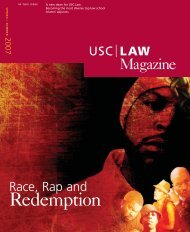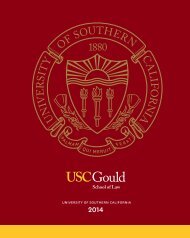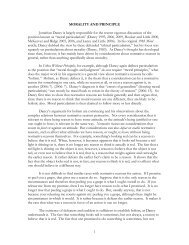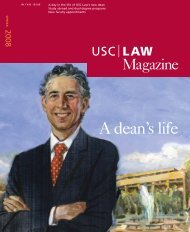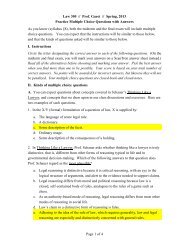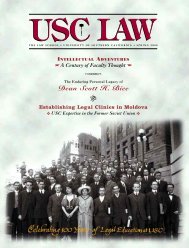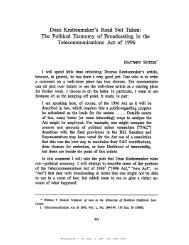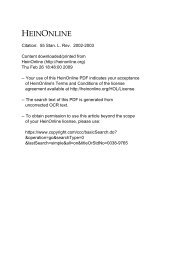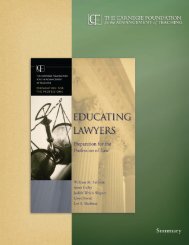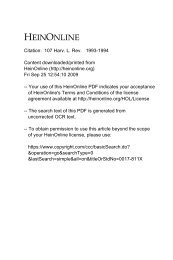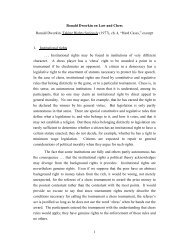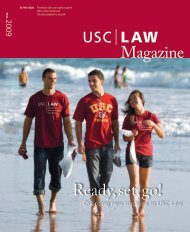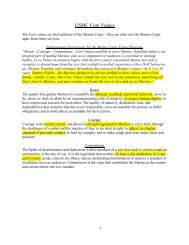download issue - USC Gould School of Law - University of Southern ...
download issue - USC Gould School of Law - University of Southern ...
download issue - USC Gould School of Law - University of Southern ...
You also want an ePaper? Increase the reach of your titles
YUMPU automatically turns print PDFs into web optimized ePapers that Google loves.
Spring / Summer 2006<br />
Magazine<br />
Faculty News<br />
25<br />
Study questions validity<br />
<strong>of</strong> cease-and-desist notices for<br />
online copyright claims<br />
Jennifer Urban<br />
Ajoint <strong>USC</strong> and <strong>University</strong> <strong>of</strong> California study<br />
has revealed that nearly a third <strong>of</strong> the copyright<br />
cease-and-desist notices sent to Google Inc. and<br />
other online service providers under the Digital<br />
Millennium Copyright Act (DMCA) have significant<br />
problems with copyright claims or likely defenses.<br />
The study, published in Silicon Valley’s Santa Clara Journal<br />
<strong>of</strong> High Tech <strong>Law</strong> and Technology in March, found extensive and<br />
overbroad applications <strong>of</strong> the DMCA process, which researchers<br />
believe severely threaten Internet speech.<br />
“The results indicate a possibly serious problem for Internet<br />
speech because DMCA notices cause online service providers<br />
to pull material from the Internet to protect themselves from<br />
copyright lawsuits, generally before their users have notice or<br />
an opportunity to respond,” says <strong>USC</strong> <strong>Law</strong> Pr<strong>of</strong>essor Jennifer<br />
Urban, director <strong>of</strong> the <strong>USC</strong> Intellectual Property Clinic and<br />
co-author <strong>of</strong> the study with Laura Quilter, a UC Berkeley<br />
Samuelson Clinic fellow.<br />
“When other legal <strong>issue</strong>s were also counted, a very high percentage<br />
<strong>of</strong> notices inspired questions about the process,” Quilter adds.<br />
Under Section 512 <strong>of</strong> the DMCA, passed in 1998 by Congress,<br />
copyright holders may ask online service providers to remove content<br />
that may infringe upon their copyrights. Because this type <strong>of</strong><br />
notice is sent with no judicial review <strong>of</strong> whether a copyright was<br />
actually infringed upon, legal researchers have worried that the<br />
system is ripe for abuse. Until this study, however, they had no<br />
way to know whether Section 512 was working as hoped, or<br />
whether people were using it inappropriately.<br />
Urban and Quilter studied a group <strong>of</strong> nearly 900 DMCA<br />
notices collected at the Chilling Effects Clearinghouse (www.chillingeffects.org),<br />
which for more than three years has been gathering<br />
cease-and-desist letters related to online expression.<br />
The majority <strong>of</strong> the notices were sent to Google Inc., which<br />
submits all such notices to Chilling Effects in order to create transparency<br />
in the process. The researchers reviewed the notices to<br />
see how <strong>of</strong>ten the complaint was legally problematic. For example,<br />
they looked at whether fair use or other defenses were applicable.<br />
“Copyright law gives creators strong rights, an important benefit<br />
to society,” says Urban. “But it also has important protections<br />
for competitors, other creators and the public. We wondered how<br />
strong the legal claims in DMCA 512 notices were, because if the<br />
underlying copyright complaints were clear-cut, then the bias<br />
toward takedown might be less <strong>of</strong> a problem.”<br />
“Unfortunately,” Quilter notes, “we found a high percentage <strong>of</strong><br />
notices — 30 percent — in which material was taken down when<br />
there was a clear question about whether it was actually infringing<br />
copyright. These are the kinds <strong>of</strong> situations where it is very important<br />
to have a court hear the dispute before material is removed.”<br />
The problems with legal arguments spilled over into other<br />
areas, adds Quilter. For example, many <strong>of</strong> the Google notices<br />
involved groups who were getting competitors’ sites pulled out<br />
<strong>of</strong> the search index. Further, some copyright holders who, it was<br />
hoped, would benefit from 512 — particularly movie and music<br />
companies — do not seem to be helped much, since that traffic<br />
has moved to peer-to-peer networks.<br />
Urban and Quilter say the process is difficult to study because<br />
it is based on private letters.<br />
“We really appreciate the willingness <strong>of</strong> online service<br />
providers such as Google to donate notices, so we can check<br />
if the process is working,” adds Urban.<br />
A summary <strong>of</strong> the study results is available online at<br />
http://mylaw.usc.edu/documents/512Rep-ExecSum_out.pdf.<br />
— Gilien Silsby




